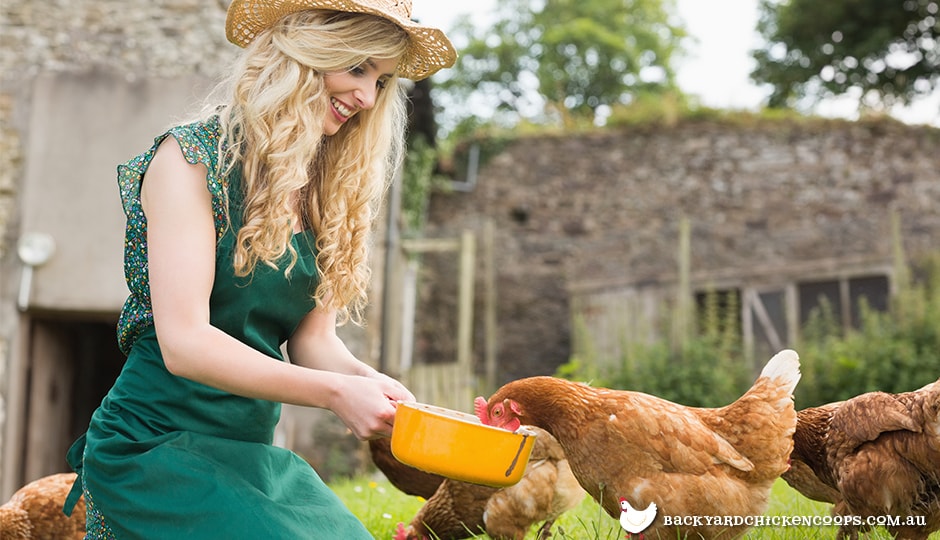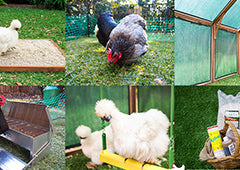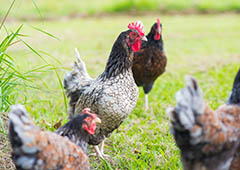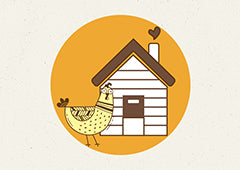Got chickens? Then you’ve no doubt engaged in some interesting clucky conversations! Chickens are very vocal by nature and will most definitely respond if you were to engage them in conversation. Chooks are just like feathery little toddlers who just discovered the wonder of words. As sociable friendly creatures, chickens enjoy vocal interactions with their backyard keepers. This engages them and strengthens the developing bond that you have with them. Clucky conversations stimulate their brain too, so embrace your inner Dr. Doolittle and chat with your chooks!
Chatting with Your Chooks
The most basic way to communicate with your flock is by chatting with them. Whether you chat with them while visiting the coop each day or while they’re out and about free ranging, engaging in lively clucky conversations, is quite an egg-straordinary experience. Chickens do have a LOT to say! As with any animal or pet, some chooks will be noisy Nellies while others will choose their clucks wisely.
Catch up on the current coop gossip when you visit each morning. Mornings are typically egg-straordinarily busy times. Your clucky chooks will greet you with tales from the coop - everything from proud proclamations regarding their egg-laying prowess to egg-citement at the possibility of free-range FREEDOM! So, have a go at chatting with them. Address your clucky chooks by their given names as you peer into their beautiful bright eyes. This simple gesture reinforces their ability to recognize their names, strengthens your relationship and egg-cites their brain activity. Mimicking them is great fun too. Why not shake up the clucky status quo a little and crow! Go ahead. Give it a go…cock-a-doodle-do to you.
Sing-a-long, Cluck-a-long!
Singing to your flock is a wonderful way to interact with them. Chickens do respond to music. Now while your chooks can’t actually carry a tune, these fine feathery music lovers have the egg-straordinary capability of appreciating the lilting notes of a pleasing melody! Research has actually shown that chickens enjoy music! In a study conducted by two Italian scientists from the University of Trento, day old chicks congregated toward consonant or pleasantly sounding music. All the more reason to let the music play. Can’t sing a note? Simply turn on some lovely background music during morning coop chores or free range time and let your chook’s pleasurable clucks and coos be music to your ears. Why not try some soothing classical music in the morning and some jazzy upbeat tunes in the afternoon and see how your chickens react!
Whistle While You Tend Your Flock
Want to attract your chooks attention? Whistle! A simple two note greeting can take on a special meaning and let your girls know when you want them to gather round for dinner or when it’s time to go to roost. They’ll come to recognize your whistle and for the most part come to understand where you want them to be! It helps to speed this learning opportunity up a bit with the some positive reinforcement of tasty treats! Just whistle as they take the treats from you and they will associate that sound with good things and coming back to coop!
Clap, Clap, Clapping May Bring Flap, Flap, Flapping!
Along with whistling when you greet your chooks, try giving a quick trio of claps during free range time to get the attention of any feathery friends who wander a bit too far. Every flock has at least one or two chooks who flap to the beat of their own wings. Now, while they may be a tad bit stubborn and not flock instantly to your feet when you clap for them to come, they will begin to associate your claps with your speedy approach as you herd them back to the approved free range area and follow with only minor clucks of eggs-asperation.

Food-Always the Great Motivator
Food is always a great motivator for animals, feathery or otherwise! But, offering your chooks tasty healthy treats also communicates love. It tells your chicken you are there for them, able to provide them all they need, regardless of the day. It is a good idea to feed your chooks on a regular schedule. It teaches them trust in you, their faithful chicken cooper. Food can be used to encourage a shy chook to come near you and be comfortable with touch. Food can also ring the clucky dinner bell to a flock of feathery egg-splorers gone wandering, who will come flapping back to the coop like CrAzY!
The Delightful Sense of Touch
Chickens definitely wear their hearts on their wings. When they’re happy, they’re happy. When they’re sad or feeling a little under the weather, they’re quieter and less active. Touching your chooks communicates love. Holding, cuddling and petting are communicative postures that show love. Chickens will respond to your touch and backyard chickens especially, can become quite tame and friendly when they are well cared for and treated with compassion and respect. Don’t be surprised when you’re chooks just pop up in your lap with a hop, skip and a flap…and a cluck or two!
Cheers to Creative Communication
No matter how you choose to interact with your fine feathered friends, creative communication works. Here’s to many clucky conversations with the feathery loves of your life. ENJOY!
Spending time with your flock and creating lasting bonds is a great way to keep check of their health and habits. Some behaviours are cute quirks for a breed and others may be a cause for concern! Like all pets, chickens can be trained to stop bad habits and reinforce positive ones.
Cluckily, our friends over at Chickenpedia have created an amazing Chicken Etiquette Course. This extensive online course shares useful advice on a variety of chicken behaviours. The well-structured course will also help you deal with bad behaviour and encourage positive behaviours. Keep the neighbours happy - their only complaint will be that they wish they also had chickens!
Learn how to have the best-behaved chickens in town with this beginner-friendly course. This is why I highly recommend Chickenpedia’s courses to all of my readers! They are filled with vital information that help you raise a happy, healthy flock.
Click here to check out Chickenpedia today!



















